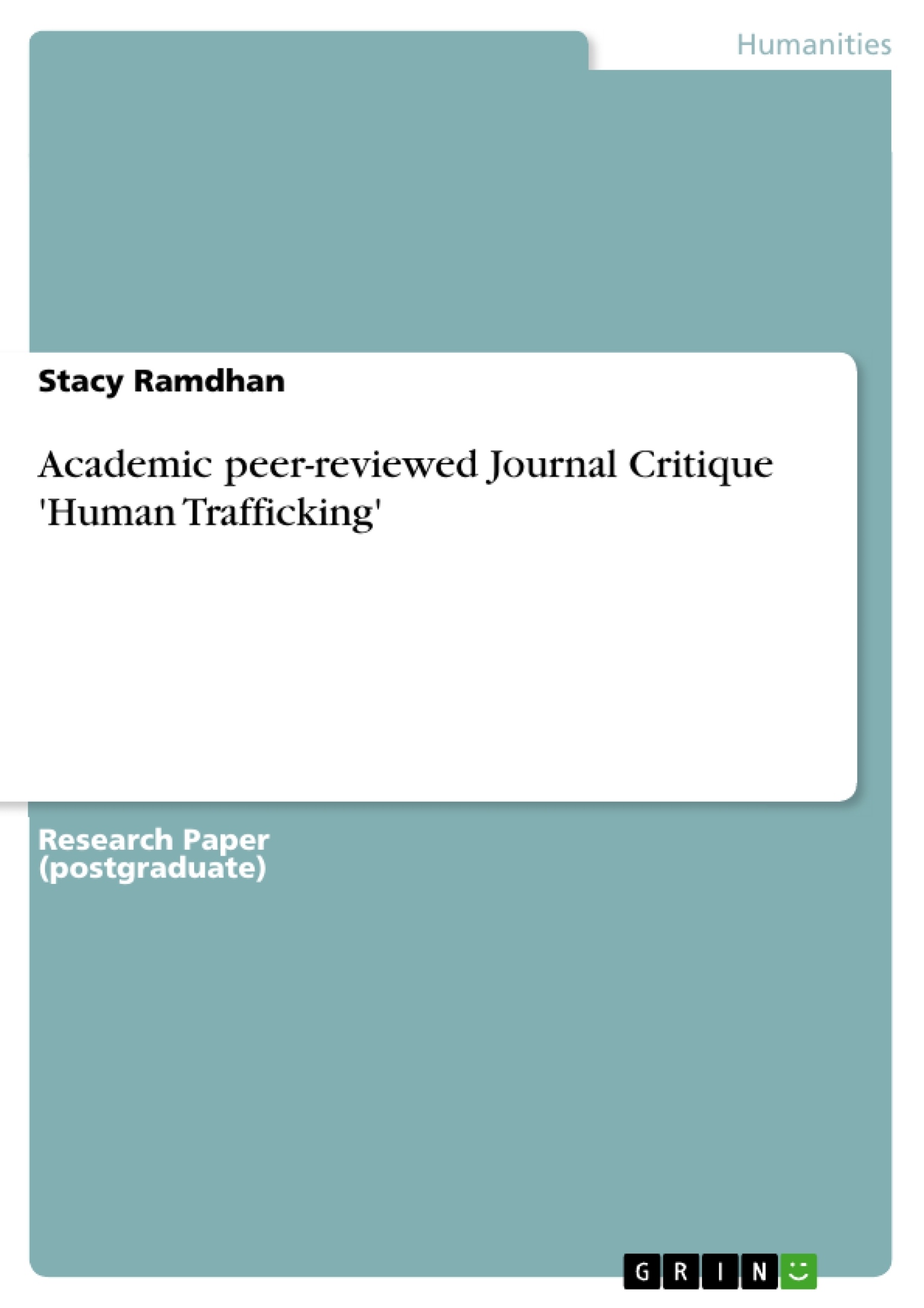
Academic peer-reviewed Journal Critique 'Human Trafficking'
Forschungsarbeit, 2010
9 Seiten, Note: A
Leseprobe
Inhaltsverzeichnis (Table of Contents)
- Introduction
- The Nature and Extent of Trafficking
- Legal Recognition and Current Responses
- Policy Responses to Sketchy Data
- Methodology and Limitations
- Qualitative Victims' Accounts
- Use of Citation Index, Guesstimates, and Estimated Statistics
- The Discursive History of Human Trafficking
- Feminist Debates
- International and U.S. Policy
- The UN's Global Programme Against Trafficking (GPAT)
- Focus on Sex Trafficking
- Overlaps with Human Smuggling
- Criticisms of Policy Responses
- Focus on Crime Against States
- Neglect of Victim Needs
- Insufficient Data and Reliability
- Underreporting and Under-Detection
- Domination of Sex Trafficking in Data
- Different Methodologies for Estimating Trafficking
- Internal Trafficking and Organized Crime
Zielsetzung und Themenschwerpunkte (Objectives and Key Themes)
This journal article critically examines the issue of human trafficking, specifically focusing on the limitations of data and the resulting policy responses. It aims to highlight the inadequacy of existing data on trafficking, particularly in terms of its reliability and validity. The article also explores the disproportionate focus on sex trafficking in policy responses, neglecting other forms of exploitation.
- Data Reliability and Validity
- Policy Responses to Limited Data
- Focus on Sex Trafficking vs. Other Forms of Exploitation
- Trafficking as a Human Rights Abuse
- The Importance of Robust Data for Effective Policy Development
Zusammenfassung der Kapitel (Chapter Summaries)
The article begins by introducing the nature and extent of human trafficking, outlining its legal recognition and current responses. It then examines the methodology used in gathering data on trafficking, highlighting the reliance on qualitative victim accounts, citation index, guesstimates, and estimated statistics. The author argues that these methods are insufficient to provide an accurate and reliable account of trafficking.
Further, the article explores the historical discourse surrounding human trafficking, particularly the feminist debates and the evolution of international and U.S. policy. It criticizes the UN's Global Programme Against Trafficking (GPAT) for its disproportionate focus on sex trafficking and its overlap with human smuggling. The article also examines the shortcomings of policy responses in addressing the needs of victims and the lack of robust data on the extent and nature of trafficking.
The article concludes by highlighting different methodologies for estimating trafficking and emphasizing the need for a comprehensive understanding of the issue, including internal trafficking and the involvement of organized crime. It urges for a more inclusive approach to policy development, one that addresses all areas of trafficking and acknowledges the complexity of the issue.
Schlüsselwörter (Keywords)
Human trafficking, sex trafficking, forced labor, data reliability, policy responses, victim rights, human rights, international cooperation, UN convention, European Union, UK, qualitative research, methodology, organized crime, data collection.
Frequently Asked Questions
What is the main criticism of current human trafficking data?
The article argues that existing data is often based on "guesstimates," estimated statistics, and qualitative victim accounts, which lack the reliability and validity needed for robust policy development.
Why is the focus on sex trafficking considered problematic in policy?
By focusing predominantly on sex trafficking, policy responses often neglect other significant forms of exploitation, such as forced labor and child trafficking.
What is the "migration-crime-security" nexus?
This term refers to the framework where trafficking is viewed primarily as a threat to state borders and security rather than a human rights violation against individuals.
What are the limitations of the UN's Global Programme Against Trafficking (GPAT)?
Critics point out its disproportionate focus on sex trafficking and the significant overlap with human smuggling, which can lead to inadequate responses for victims of other trafficking types.
How does underreporting affect trafficking statistics?
Due to the clandestine nature of the crime and the vulnerability of victims, under-detection and underreporting are major hurdles, making it difficult to assess the true extent of trafficking.
What research areas could improve policy responses?
The author suggests researching the "demand side" of exploitation and gaining more knowledge about the traffickers themselves to create more effective prevention strategies.
Details
- Titel
- Academic peer-reviewed Journal Critique 'Human Trafficking'
- Hochschule
- The University of the West Indies, St. Augustine
- Veranstaltung
- Theories and Issues in Criminalogy
- Note
- A
- Autor
- BSc, MSc Stacy Ramdhan (Autor:in)
- Erscheinungsjahr
- 2010
- Seiten
- 9
- Katalognummer
- V175791
- ISBN (eBook)
- 9783640968619
- ISBN (Buch)
- 9783656366737
- Dateigröße
- 455 KB
- Sprache
- Englisch
- Schlagworte
- academic journal critique human trafficking
- Produktsicherheit
- GRIN Publishing GmbH
- Preis (Ebook)
- US$ 6,99
- Preis (Book)
- US$ 16,99
- Arbeit zitieren
- BSc, MSc Stacy Ramdhan (Autor:in), 2010, Academic peer-reviewed Journal Critique 'Human Trafficking', München, Page::Imprint:: GRINVerlagOHG, https://www.diplomarbeiten24.de/document/175791
- Autor werden
- Ihre Optionen
- Vertriebskanäle
- Premium Services
- Autorenprofil
- Textarten und Formate
- Services für Verlage, Hochschulen, Unternehmen

- © GRIN Publishing GmbH.
- Alle Inhalte urheberrechtlich geschützt. Kopieren und verbreiten untersagt.
- info@grin.com
- AGB
- Open Publishing
Der GRIN Verlag hat sich seit 1998 auf die Veröffentlichung akademischer eBooks und Bücher spezialisiert. Der GRIN Verlag steht damit als erstes Unternehmen für User Generated Quality Content. Die Verlagsseiten GRIN.com, Hausarbeiten.de und Diplomarbeiten24 bieten für Hochschullehrer, Absolventen und Studenten die ideale Plattform, wissenschaftliche Texte wie Hausarbeiten, Referate, Bachelorarbeiten, Masterarbeiten, Diplomarbeiten, Dissertationen und wissenschaftliche Aufsätze einem breiten Publikum zu präsentieren.
Kostenfreie Veröffentlichung: Hausarbeit, Bachelorarbeit, Diplomarbeit, Dissertation, Masterarbeit, Interpretation oder Referat jetzt veröffentlichen!
- GRIN Verlag GmbH
-
- Nymphenburger Str. 86
- 80636
- Munich, Deutschland
- +49 89-550559-0
- +49 89-550559-10
- info@grin.com
-









